Business Law Assignment: Contract Law, Agency, and Misrepresentation
VerifiedAdded on 2019/11/19
|10
|2041
|145
Homework Assignment
AI Summary
This business law assignment analyzes two distinct scenarios. The first involves a contract dispute between Qantas Airlines Ltd and Airbus Corporation Ltd, examining issues of contract formation, breach of warranty, and the validity of exclusion clauses. It explores whether Qantas can claim damages for Airbus's failure to provide the agreed-upon services and the enforceability of terms introduced after the contract was signed. The second scenario focuses on agency and misrepresentation. It investigates whether Frank can claim against Gemma for misrepresentation in the sale of a dishwasher and whether Frank is bound by a contract entered into by his agent, Bob, after his termination. The assignment applies legal principles of misrepresentation, fraudulent misrepresentation, and apparent authority to determine the liabilities and rights of the parties involved.
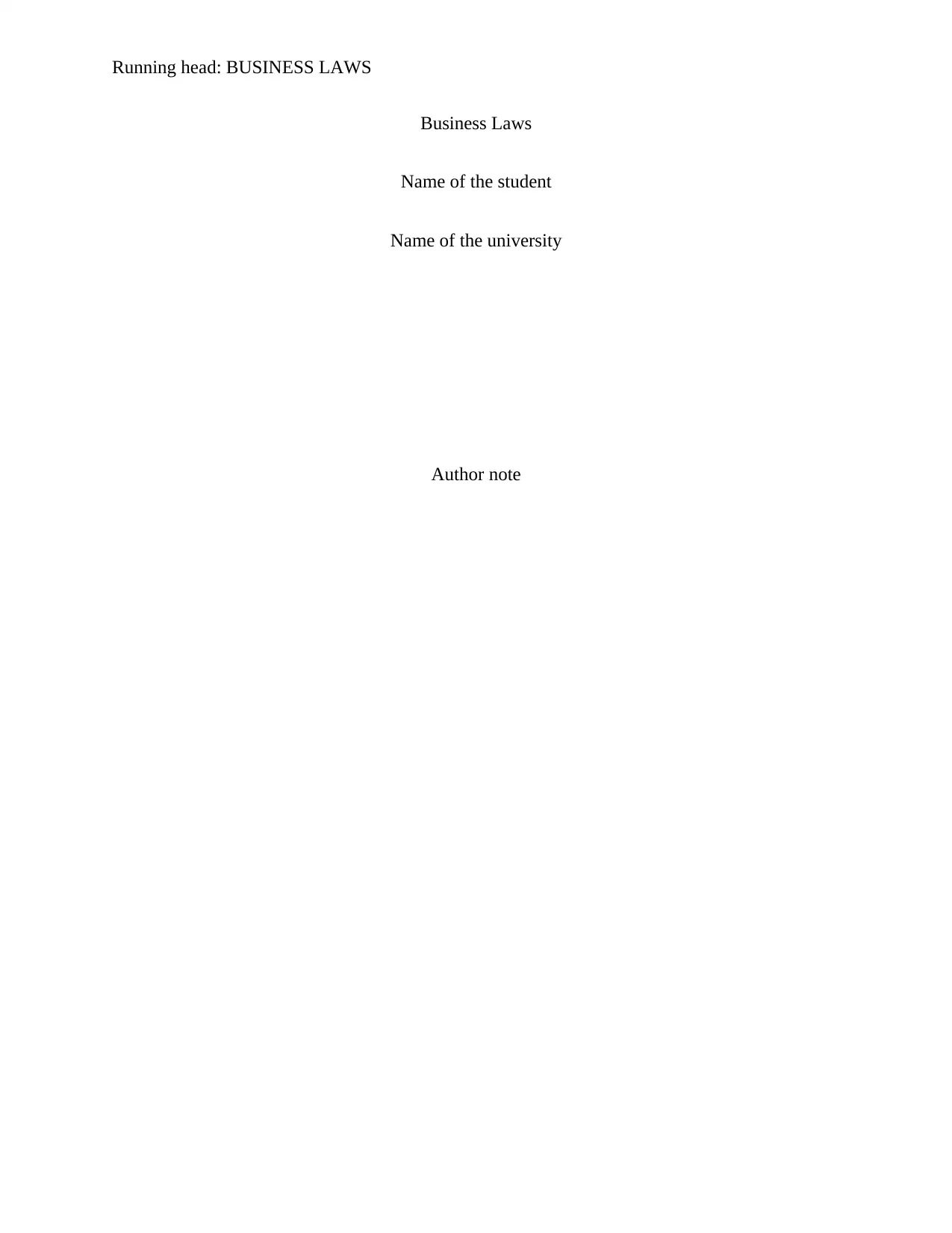
Running head: BUSINESS LAWS
Business Laws
Name of the student
Name of the university
Author note
Business Laws
Name of the student
Name of the university
Author note
Paraphrase This Document
Need a fresh take? Get an instant paraphrase of this document with our AI Paraphraser
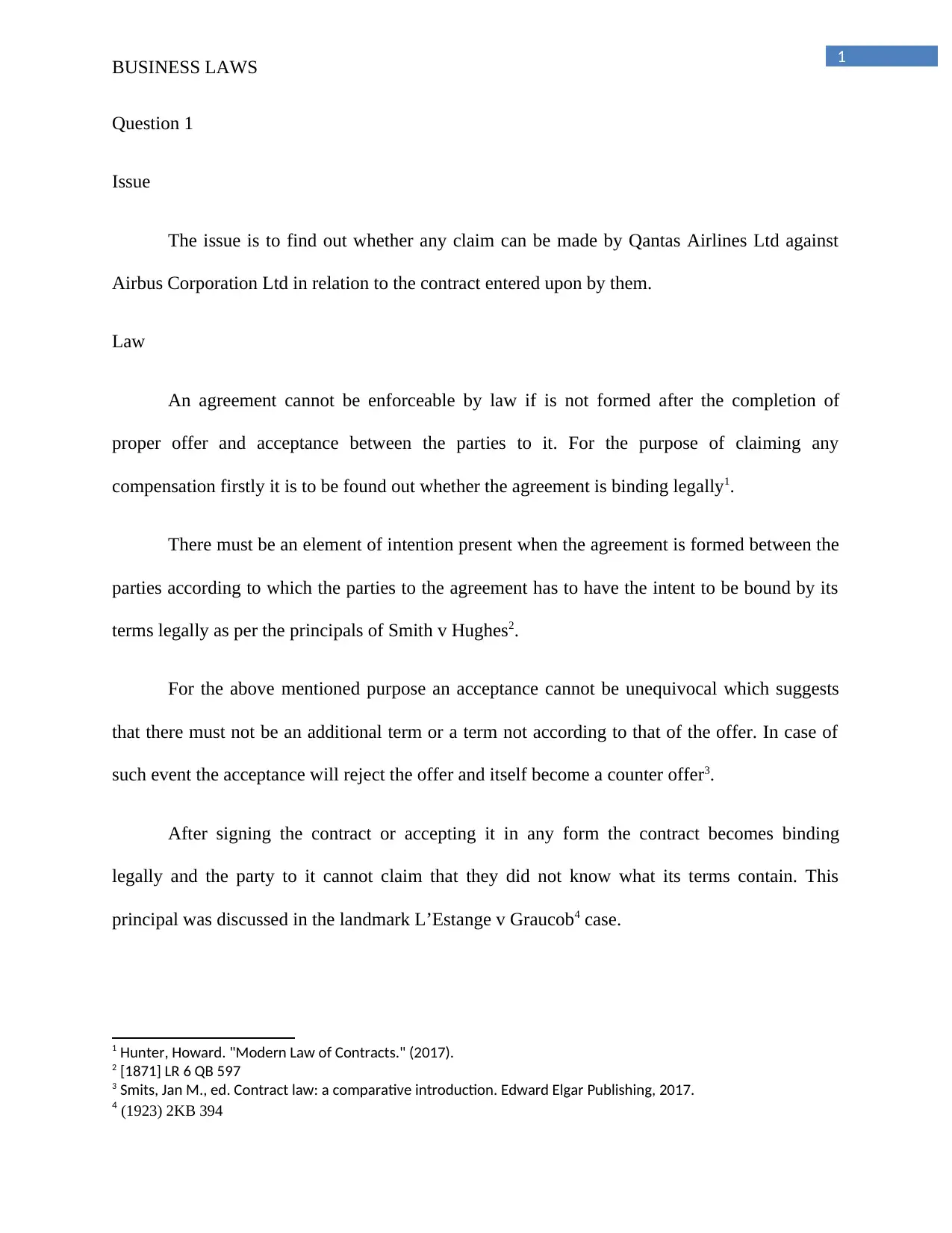
1
BUSINESS LAWS
Question 1
Issue
The issue is to find out whether any claim can be made by Qantas Airlines Ltd against
Airbus Corporation Ltd in relation to the contract entered upon by them.
Law
An agreement cannot be enforceable by law if is not formed after the completion of
proper offer and acceptance between the parties to it. For the purpose of claiming any
compensation firstly it is to be found out whether the agreement is binding legally1.
There must be an element of intention present when the agreement is formed between the
parties according to which the parties to the agreement has to have the intent to be bound by its
terms legally as per the principals of Smith v Hughes2.
For the above mentioned purpose an acceptance cannot be unequivocal which suggests
that there must not be an additional term or a term not according to that of the offer. In case of
such event the acceptance will reject the offer and itself become a counter offer3.
After signing the contract or accepting it in any form the contract becomes binding
legally and the party to it cannot claim that they did not know what its terms contain. This
principal was discussed in the landmark L’Estange v Graucob4 case.
1 Hunter, Howard. "Modern Law of Contracts." (2017).
2 [1871] LR 6 QB 597
3 Smits, Jan M., ed. Contract law: a comparative introduction. Edward Elgar Publishing, 2017.
4 (1923) 2KB 394
BUSINESS LAWS
Question 1
Issue
The issue is to find out whether any claim can be made by Qantas Airlines Ltd against
Airbus Corporation Ltd in relation to the contract entered upon by them.
Law
An agreement cannot be enforceable by law if is not formed after the completion of
proper offer and acceptance between the parties to it. For the purpose of claiming any
compensation firstly it is to be found out whether the agreement is binding legally1.
There must be an element of intention present when the agreement is formed between the
parties according to which the parties to the agreement has to have the intent to be bound by its
terms legally as per the principals of Smith v Hughes2.
For the above mentioned purpose an acceptance cannot be unequivocal which suggests
that there must not be an additional term or a term not according to that of the offer. In case of
such event the acceptance will reject the offer and itself become a counter offer3.
After signing the contract or accepting it in any form the contract becomes binding
legally and the party to it cannot claim that they did not know what its terms contain. This
principal was discussed in the landmark L’Estange v Graucob4 case.
1 Hunter, Howard. "Modern Law of Contracts." (2017).
2 [1871] LR 6 QB 597
3 Smits, Jan M., ed. Contract law: a comparative introduction. Edward Elgar Publishing, 2017.
4 (1923) 2KB 394
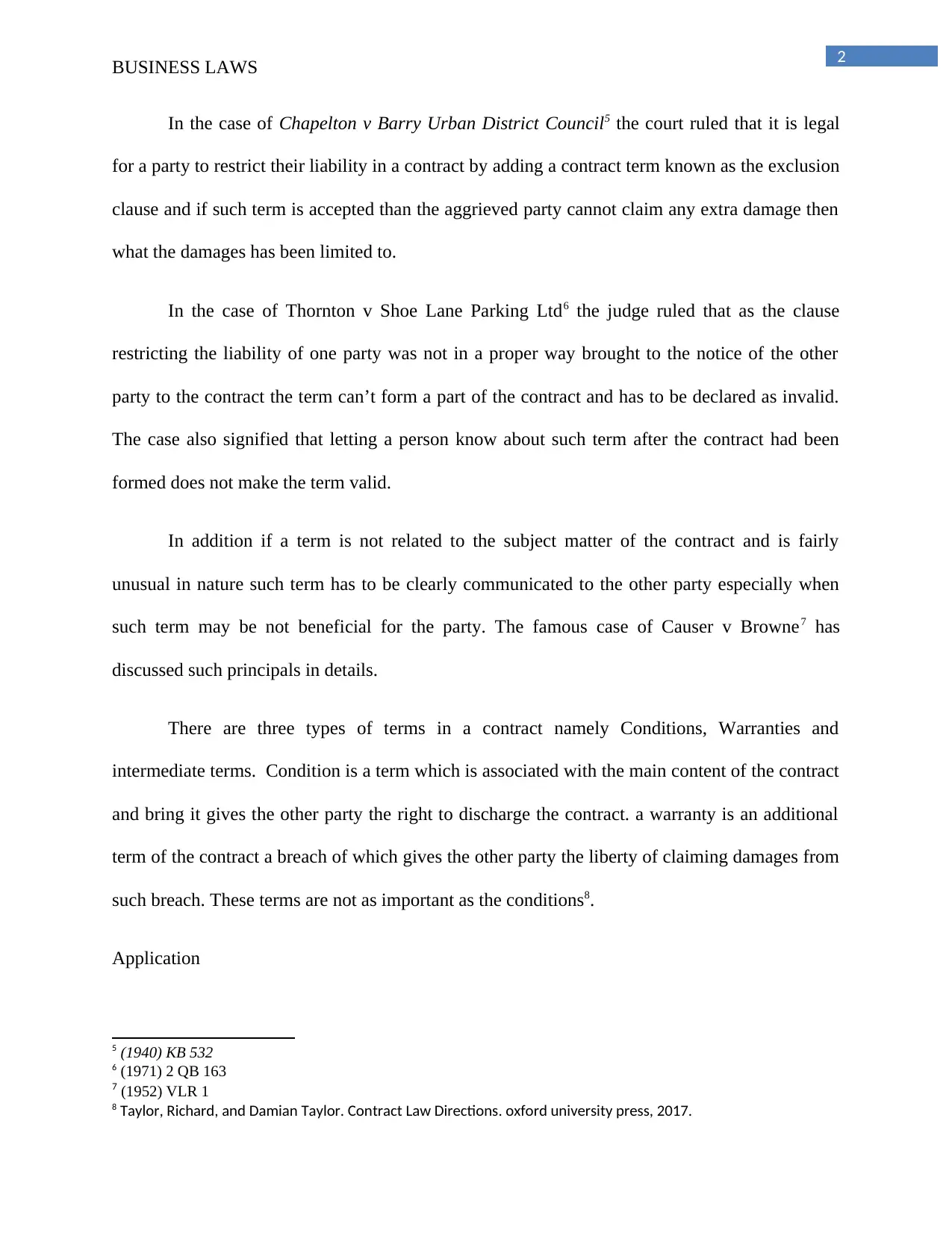
2
BUSINESS LAWS
In the case of Chapelton v Barry Urban District Council5 the court ruled that it is legal
for a party to restrict their liability in a contract by adding a contract term known as the exclusion
clause and if such term is accepted than the aggrieved party cannot claim any extra damage then
what the damages has been limited to.
In the case of Thornton v Shoe Lane Parking Ltd6 the judge ruled that as the clause
restricting the liability of one party was not in a proper way brought to the notice of the other
party to the contract the term can’t form a part of the contract and has to be declared as invalid.
The case also signified that letting a person know about such term after the contract had been
formed does not make the term valid.
In addition if a term is not related to the subject matter of the contract and is fairly
unusual in nature such term has to be clearly communicated to the other party especially when
such term may be not beneficial for the party. The famous case of Causer v Browne7 has
discussed such principals in details.
There are three types of terms in a contract namely Conditions, Warranties and
intermediate terms. Condition is a term which is associated with the main content of the contract
and bring it gives the other party the right to discharge the contract. a warranty is an additional
term of the contract a breach of which gives the other party the liberty of claiming damages from
such breach. These terms are not as important as the conditions8.
Application
5 (1940) KB 532
6 (1971) 2 QB 163
7 (1952) VLR 1
8 Taylor, Richard, and Damian Taylor. Contract Law Directions. oxford university press, 2017.
BUSINESS LAWS
In the case of Chapelton v Barry Urban District Council5 the court ruled that it is legal
for a party to restrict their liability in a contract by adding a contract term known as the exclusion
clause and if such term is accepted than the aggrieved party cannot claim any extra damage then
what the damages has been limited to.
In the case of Thornton v Shoe Lane Parking Ltd6 the judge ruled that as the clause
restricting the liability of one party was not in a proper way brought to the notice of the other
party to the contract the term can’t form a part of the contract and has to be declared as invalid.
The case also signified that letting a person know about such term after the contract had been
formed does not make the term valid.
In addition if a term is not related to the subject matter of the contract and is fairly
unusual in nature such term has to be clearly communicated to the other party especially when
such term may be not beneficial for the party. The famous case of Causer v Browne7 has
discussed such principals in details.
There are three types of terms in a contract namely Conditions, Warranties and
intermediate terms. Condition is a term which is associated with the main content of the contract
and bring it gives the other party the right to discharge the contract. a warranty is an additional
term of the contract a breach of which gives the other party the liberty of claiming damages from
such breach. These terms are not as important as the conditions8.
Application
5 (1940) KB 532
6 (1971) 2 QB 163
7 (1952) VLR 1
8 Taylor, Richard, and Damian Taylor. Contract Law Directions. oxford university press, 2017.
⊘ This is a preview!⊘
Do you want full access?
Subscribe today to unlock all pages.

Trusted by 1+ million students worldwide
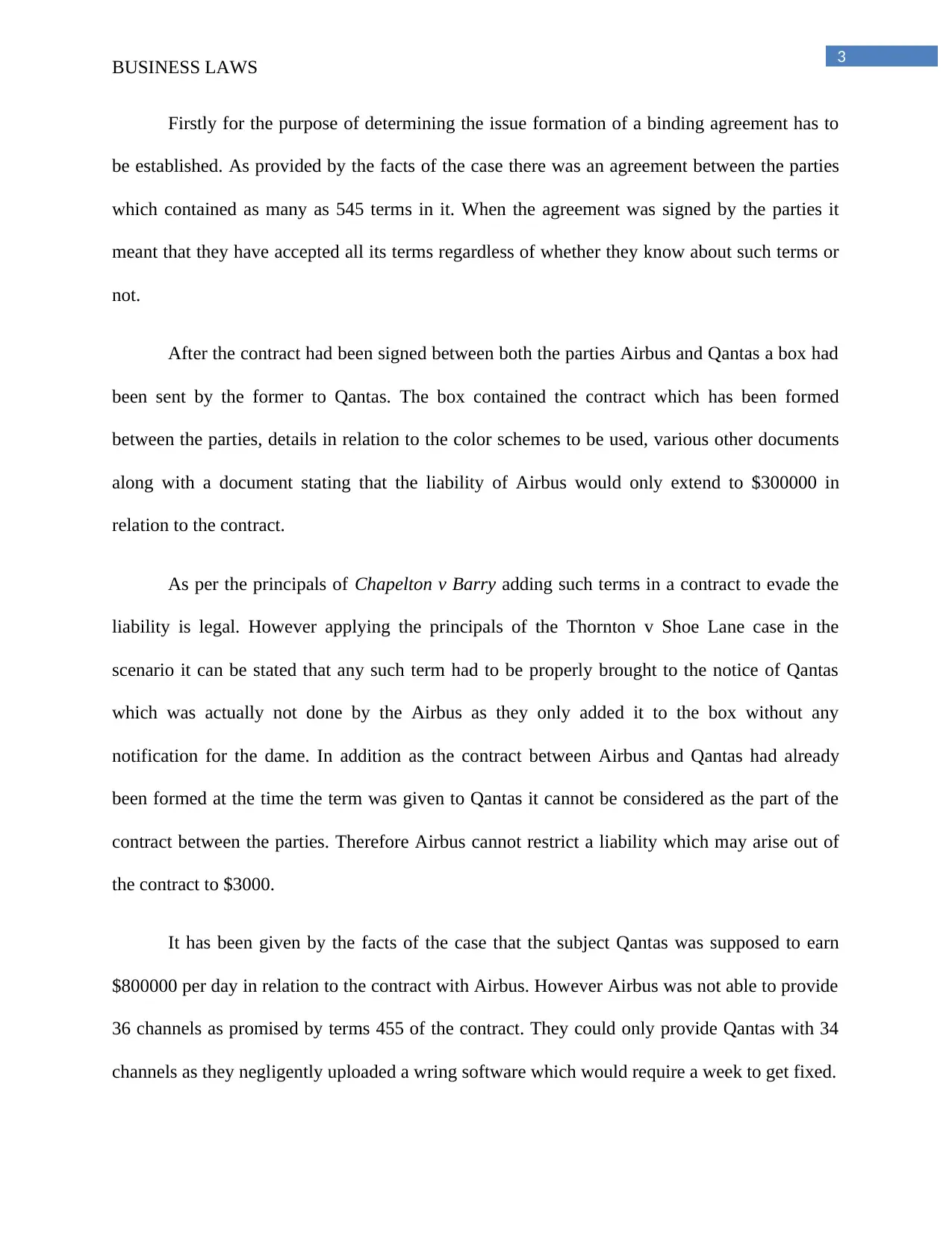
3
BUSINESS LAWS
Firstly for the purpose of determining the issue formation of a binding agreement has to
be established. As provided by the facts of the case there was an agreement between the parties
which contained as many as 545 terms in it. When the agreement was signed by the parties it
meant that they have accepted all its terms regardless of whether they know about such terms or
not.
After the contract had been signed between both the parties Airbus and Qantas a box had
been sent by the former to Qantas. The box contained the contract which has been formed
between the parties, details in relation to the color schemes to be used, various other documents
along with a document stating that the liability of Airbus would only extend to $300000 in
relation to the contract.
As per the principals of Chapelton v Barry adding such terms in a contract to evade the
liability is legal. However applying the principals of the Thornton v Shoe Lane case in the
scenario it can be stated that any such term had to be properly brought to the notice of Qantas
which was actually not done by the Airbus as they only added it to the box without any
notification for the dame. In addition as the contract between Airbus and Qantas had already
been formed at the time the term was given to Qantas it cannot be considered as the part of the
contract between the parties. Therefore Airbus cannot restrict a liability which may arise out of
the contract to $3000.
It has been given by the facts of the case that the subject Qantas was supposed to earn
$800000 per day in relation to the contract with Airbus. However Airbus was not able to provide
36 channels as promised by terms 455 of the contract. They could only provide Qantas with 34
channels as they negligently uploaded a wring software which would require a week to get fixed.
BUSINESS LAWS
Firstly for the purpose of determining the issue formation of a binding agreement has to
be established. As provided by the facts of the case there was an agreement between the parties
which contained as many as 545 terms in it. When the agreement was signed by the parties it
meant that they have accepted all its terms regardless of whether they know about such terms or
not.
After the contract had been signed between both the parties Airbus and Qantas a box had
been sent by the former to Qantas. The box contained the contract which has been formed
between the parties, details in relation to the color schemes to be used, various other documents
along with a document stating that the liability of Airbus would only extend to $300000 in
relation to the contract.
As per the principals of Chapelton v Barry adding such terms in a contract to evade the
liability is legal. However applying the principals of the Thornton v Shoe Lane case in the
scenario it can be stated that any such term had to be properly brought to the notice of Qantas
which was actually not done by the Airbus as they only added it to the box without any
notification for the dame. In addition as the contract between Airbus and Qantas had already
been formed at the time the term was given to Qantas it cannot be considered as the part of the
contract between the parties. Therefore Airbus cannot restrict a liability which may arise out of
the contract to $3000.
It has been given by the facts of the case that the subject Qantas was supposed to earn
$800000 per day in relation to the contract with Airbus. However Airbus was not able to provide
36 channels as promised by terms 455 of the contract. They could only provide Qantas with 34
channels as they negligently uploaded a wring software which would require a week to get fixed.
Paraphrase This Document
Need a fresh take? Get an instant paraphrase of this document with our AI Paraphraser
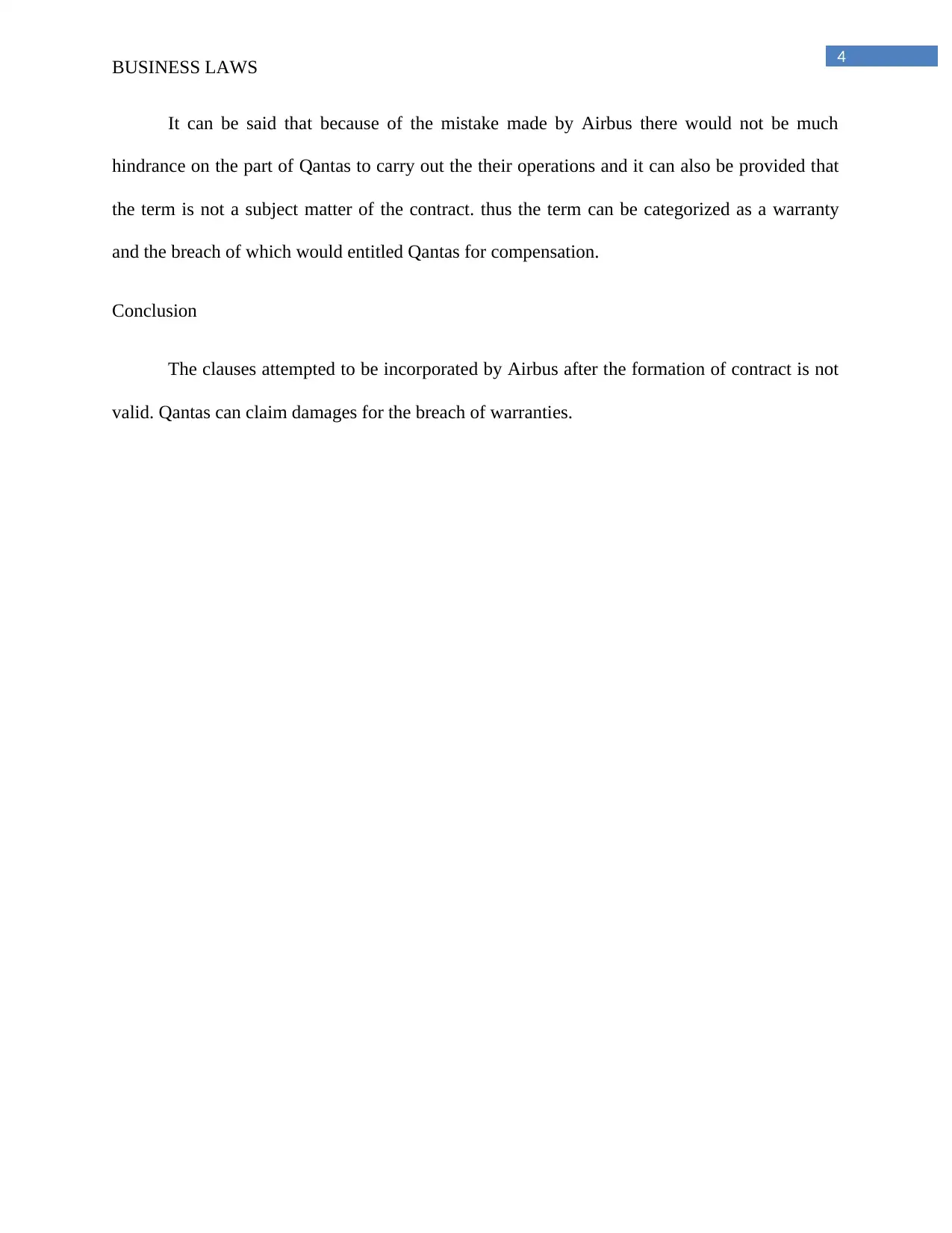
4
BUSINESS LAWS
It can be said that because of the mistake made by Airbus there would not be much
hindrance on the part of Qantas to carry out the their operations and it can also be provided that
the term is not a subject matter of the contract. thus the term can be categorized as a warranty
and the breach of which would entitled Qantas for compensation.
Conclusion
The clauses attempted to be incorporated by Airbus after the formation of contract is not
valid. Qantas can claim damages for the breach of warranties.
BUSINESS LAWS
It can be said that because of the mistake made by Airbus there would not be much
hindrance on the part of Qantas to carry out the their operations and it can also be provided that
the term is not a subject matter of the contract. thus the term can be categorized as a warranty
and the breach of which would entitled Qantas for compensation.
Conclusion
The clauses attempted to be incorporated by Airbus after the formation of contract is not
valid. Qantas can claim damages for the breach of warranties.
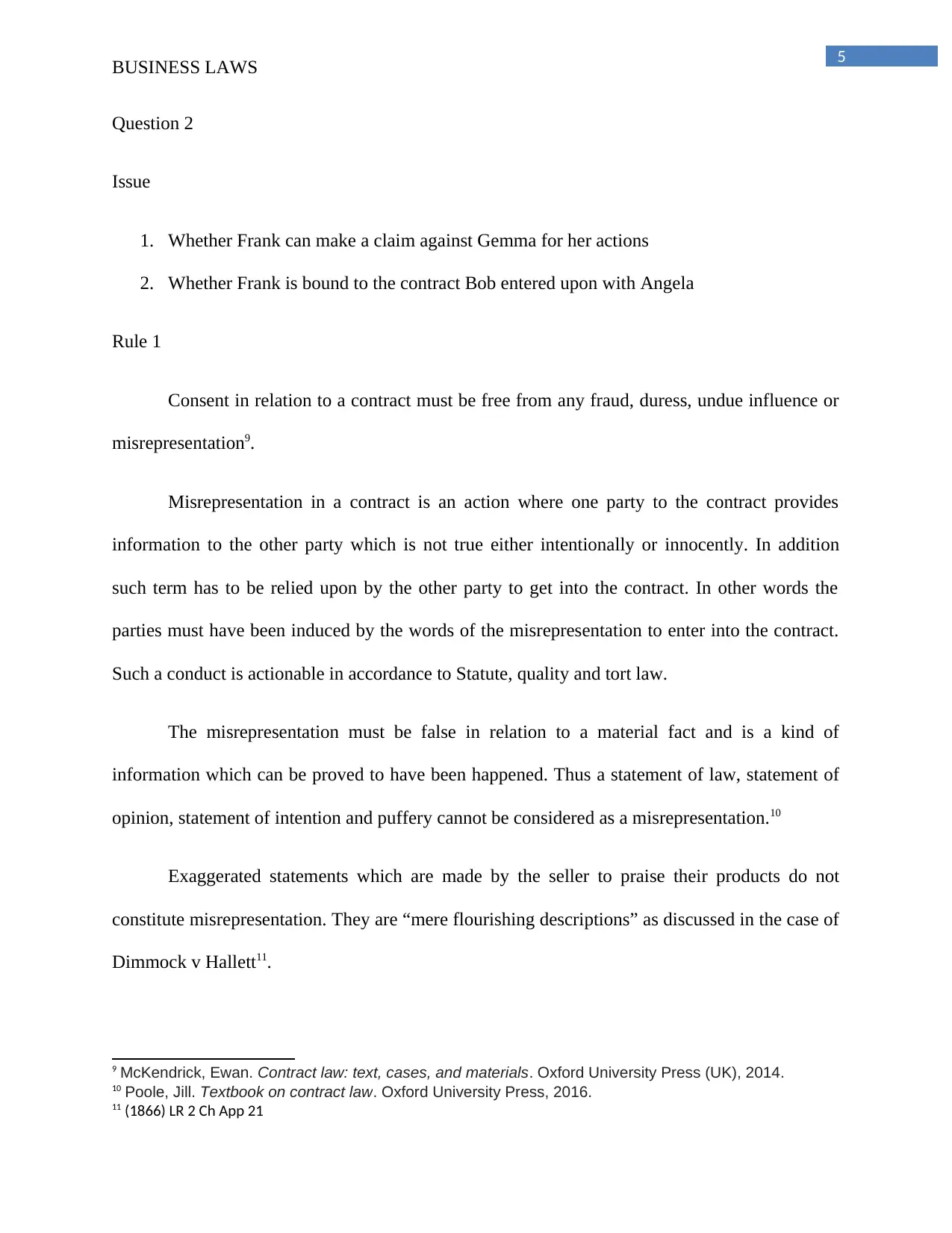
5
BUSINESS LAWS
Question 2
Issue
1. Whether Frank can make a claim against Gemma for her actions
2. Whether Frank is bound to the contract Bob entered upon with Angela
Rule 1
Consent in relation to a contract must be free from any fraud, duress, undue influence or
misrepresentation9.
Misrepresentation in a contract is an action where one party to the contract provides
information to the other party which is not true either intentionally or innocently. In addition
such term has to be relied upon by the other party to get into the contract. In other words the
parties must have been induced by the words of the misrepresentation to enter into the contract.
Such a conduct is actionable in accordance to Statute, quality and tort law.
The misrepresentation must be false in relation to a material fact and is a kind of
information which can be proved to have been happened. Thus a statement of law, statement of
opinion, statement of intention and puffery cannot be considered as a misrepresentation.10
Exaggerated statements which are made by the seller to praise their products do not
constitute misrepresentation. They are “mere flourishing descriptions” as discussed in the case of
Dimmock v Hallett11.
9 McKendrick, Ewan. Contract law: text, cases, and materials. Oxford University Press (UK), 2014.
10 Poole, Jill. Textbook on contract law. Oxford University Press, 2016.
11 (1866) LR 2 Ch App 21
BUSINESS LAWS
Question 2
Issue
1. Whether Frank can make a claim against Gemma for her actions
2. Whether Frank is bound to the contract Bob entered upon with Angela
Rule 1
Consent in relation to a contract must be free from any fraud, duress, undue influence or
misrepresentation9.
Misrepresentation in a contract is an action where one party to the contract provides
information to the other party which is not true either intentionally or innocently. In addition
such term has to be relied upon by the other party to get into the contract. In other words the
parties must have been induced by the words of the misrepresentation to enter into the contract.
Such a conduct is actionable in accordance to Statute, quality and tort law.
The misrepresentation must be false in relation to a material fact and is a kind of
information which can be proved to have been happened. Thus a statement of law, statement of
opinion, statement of intention and puffery cannot be considered as a misrepresentation.10
Exaggerated statements which are made by the seller to praise their products do not
constitute misrepresentation. They are “mere flourishing descriptions” as discussed in the case of
Dimmock v Hallett11.
9 McKendrick, Ewan. Contract law: text, cases, and materials. Oxford University Press (UK), 2014.
10 Poole, Jill. Textbook on contract law. Oxford University Press, 2016.
11 (1866) LR 2 Ch App 21
⊘ This is a preview!⊘
Do you want full access?
Subscribe today to unlock all pages.

Trusted by 1+ million students worldwide
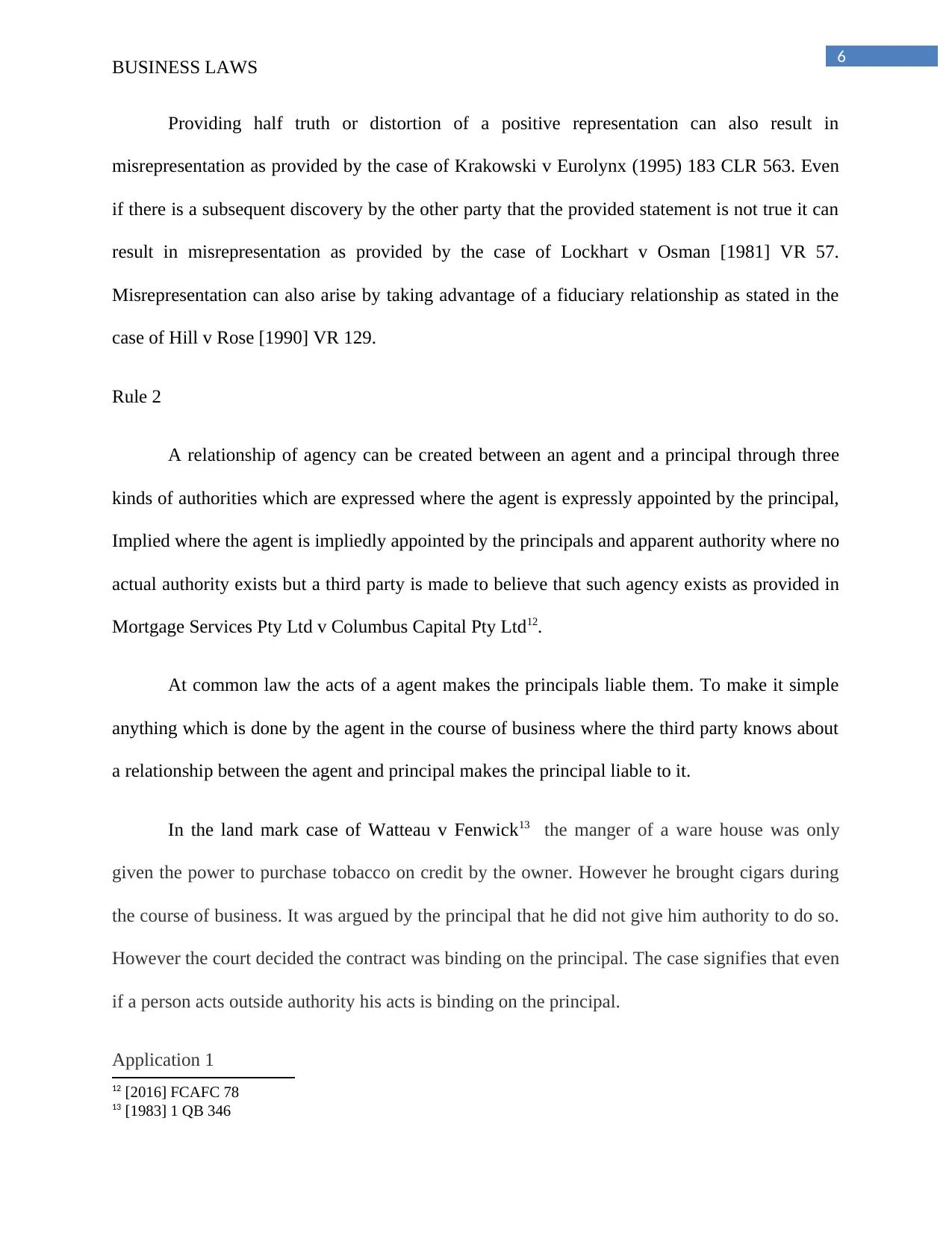
6
BUSINESS LAWS
Providing half truth or distortion of a positive representation can also result in
misrepresentation as provided by the case of Krakowski v Eurolynx (1995) 183 CLR 563. Even
if there is a subsequent discovery by the other party that the provided statement is not true it can
result in misrepresentation as provided by the case of Lockhart v Osman [1981] VR 57.
Misrepresentation can also arise by taking advantage of a fiduciary relationship as stated in the
case of Hill v Rose [1990] VR 129.
Rule 2
A relationship of agency can be created between an agent and a principal through three
kinds of authorities which are expressed where the agent is expressly appointed by the principal,
Implied where the agent is impliedly appointed by the principals and apparent authority where no
actual authority exists but a third party is made to believe that such agency exists as provided in
Mortgage Services Pty Ltd v Columbus Capital Pty Ltd12.
At common law the acts of a agent makes the principals liable them. To make it simple
anything which is done by the agent in the course of business where the third party knows about
a relationship between the agent and principal makes the principal liable to it.
In the land mark case of Watteau v Fenwick13 the manger of a ware house was only
given the power to purchase tobacco on credit by the owner. However he brought cigars during
the course of business. It was argued by the principal that he did not give him authority to do so.
However the court decided the contract was binding on the principal. The case signifies that even
if a person acts outside authority his acts is binding on the principal.
Application 1
12 [2016] FCAFC 78
13 [1983] 1 QB 346
BUSINESS LAWS
Providing half truth or distortion of a positive representation can also result in
misrepresentation as provided by the case of Krakowski v Eurolynx (1995) 183 CLR 563. Even
if there is a subsequent discovery by the other party that the provided statement is not true it can
result in misrepresentation as provided by the case of Lockhart v Osman [1981] VR 57.
Misrepresentation can also arise by taking advantage of a fiduciary relationship as stated in the
case of Hill v Rose [1990] VR 129.
Rule 2
A relationship of agency can be created between an agent and a principal through three
kinds of authorities which are expressed where the agent is expressly appointed by the principal,
Implied where the agent is impliedly appointed by the principals and apparent authority where no
actual authority exists but a third party is made to believe that such agency exists as provided in
Mortgage Services Pty Ltd v Columbus Capital Pty Ltd12.
At common law the acts of a agent makes the principals liable them. To make it simple
anything which is done by the agent in the course of business where the third party knows about
a relationship between the agent and principal makes the principal liable to it.
In the land mark case of Watteau v Fenwick13 the manger of a ware house was only
given the power to purchase tobacco on credit by the owner. However he brought cigars during
the course of business. It was argued by the principal that he did not give him authority to do so.
However the court decided the contract was binding on the principal. The case signifies that even
if a person acts outside authority his acts is binding on the principal.
Application 1
12 [2016] FCAFC 78
13 [1983] 1 QB 346
Paraphrase This Document
Need a fresh take? Get an instant paraphrase of this document with our AI Paraphraser
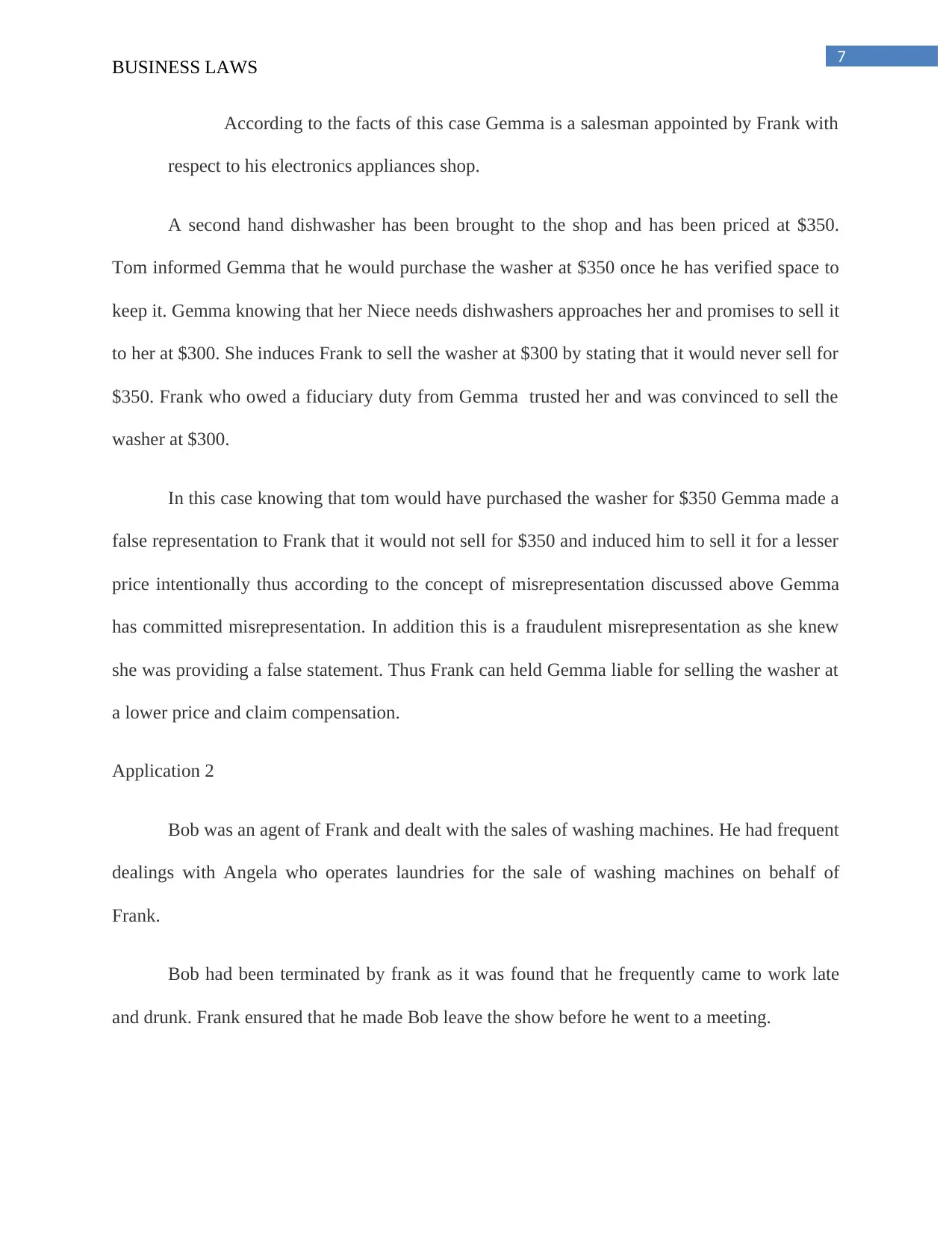
7
BUSINESS LAWS
According to the facts of this case Gemma is a salesman appointed by Frank with
respect to his electronics appliances shop.
A second hand dishwasher has been brought to the shop and has been priced at $350.
Tom informed Gemma that he would purchase the washer at $350 once he has verified space to
keep it. Gemma knowing that her Niece needs dishwashers approaches her and promises to sell it
to her at $300. She induces Frank to sell the washer at $300 by stating that it would never sell for
$350. Frank who owed a fiduciary duty from Gemma trusted her and was convinced to sell the
washer at $300.
In this case knowing that tom would have purchased the washer for $350 Gemma made a
false representation to Frank that it would not sell for $350 and induced him to sell it for a lesser
price intentionally thus according to the concept of misrepresentation discussed above Gemma
has committed misrepresentation. In addition this is a fraudulent misrepresentation as she knew
she was providing a false statement. Thus Frank can held Gemma liable for selling the washer at
a lower price and claim compensation.
Application 2
Bob was an agent of Frank and dealt with the sales of washing machines. He had frequent
dealings with Angela who operates laundries for the sale of washing machines on behalf of
Frank.
Bob had been terminated by frank as it was found that he frequently came to work late
and drunk. Frank ensured that he made Bob leave the show before he went to a meeting.
BUSINESS LAWS
According to the facts of this case Gemma is a salesman appointed by Frank with
respect to his electronics appliances shop.
A second hand dishwasher has been brought to the shop and has been priced at $350.
Tom informed Gemma that he would purchase the washer at $350 once he has verified space to
keep it. Gemma knowing that her Niece needs dishwashers approaches her and promises to sell it
to her at $300. She induces Frank to sell the washer at $300 by stating that it would never sell for
$350. Frank who owed a fiduciary duty from Gemma trusted her and was convinced to sell the
washer at $300.
In this case knowing that tom would have purchased the washer for $350 Gemma made a
false representation to Frank that it would not sell for $350 and induced him to sell it for a lesser
price intentionally thus according to the concept of misrepresentation discussed above Gemma
has committed misrepresentation. In addition this is a fraudulent misrepresentation as she knew
she was providing a false statement. Thus Frank can held Gemma liable for selling the washer at
a lower price and claim compensation.
Application 2
Bob was an agent of Frank and dealt with the sales of washing machines. He had frequent
dealings with Angela who operates laundries for the sale of washing machines on behalf of
Frank.
Bob had been terminated by frank as it was found that he frequently came to work late
and drunk. Frank ensured that he made Bob leave the show before he went to a meeting.
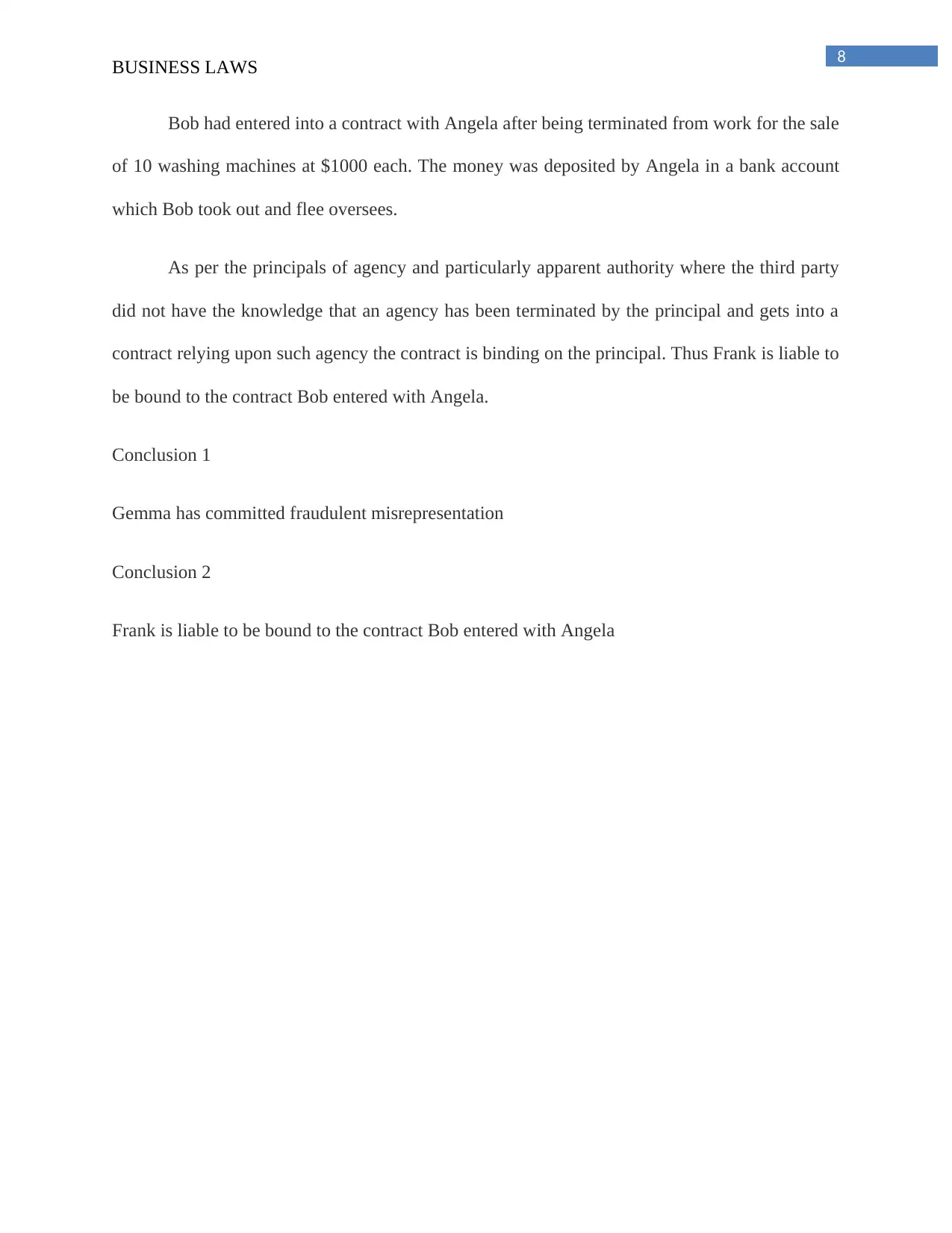
8
BUSINESS LAWS
Bob had entered into a contract with Angela after being terminated from work for the sale
of 10 washing machines at $1000 each. The money was deposited by Angela in a bank account
which Bob took out and flee oversees.
As per the principals of agency and particularly apparent authority where the third party
did not have the knowledge that an agency has been terminated by the principal and gets into a
contract relying upon such agency the contract is binding on the principal. Thus Frank is liable to
be bound to the contract Bob entered with Angela.
Conclusion 1
Gemma has committed fraudulent misrepresentation
Conclusion 2
Frank is liable to be bound to the contract Bob entered with Angela
BUSINESS LAWS
Bob had entered into a contract with Angela after being terminated from work for the sale
of 10 washing machines at $1000 each. The money was deposited by Angela in a bank account
which Bob took out and flee oversees.
As per the principals of agency and particularly apparent authority where the third party
did not have the knowledge that an agency has been terminated by the principal and gets into a
contract relying upon such agency the contract is binding on the principal. Thus Frank is liable to
be bound to the contract Bob entered with Angela.
Conclusion 1
Gemma has committed fraudulent misrepresentation
Conclusion 2
Frank is liable to be bound to the contract Bob entered with Angela
⊘ This is a preview!⊘
Do you want full access?
Subscribe today to unlock all pages.

Trusted by 1+ million students worldwide
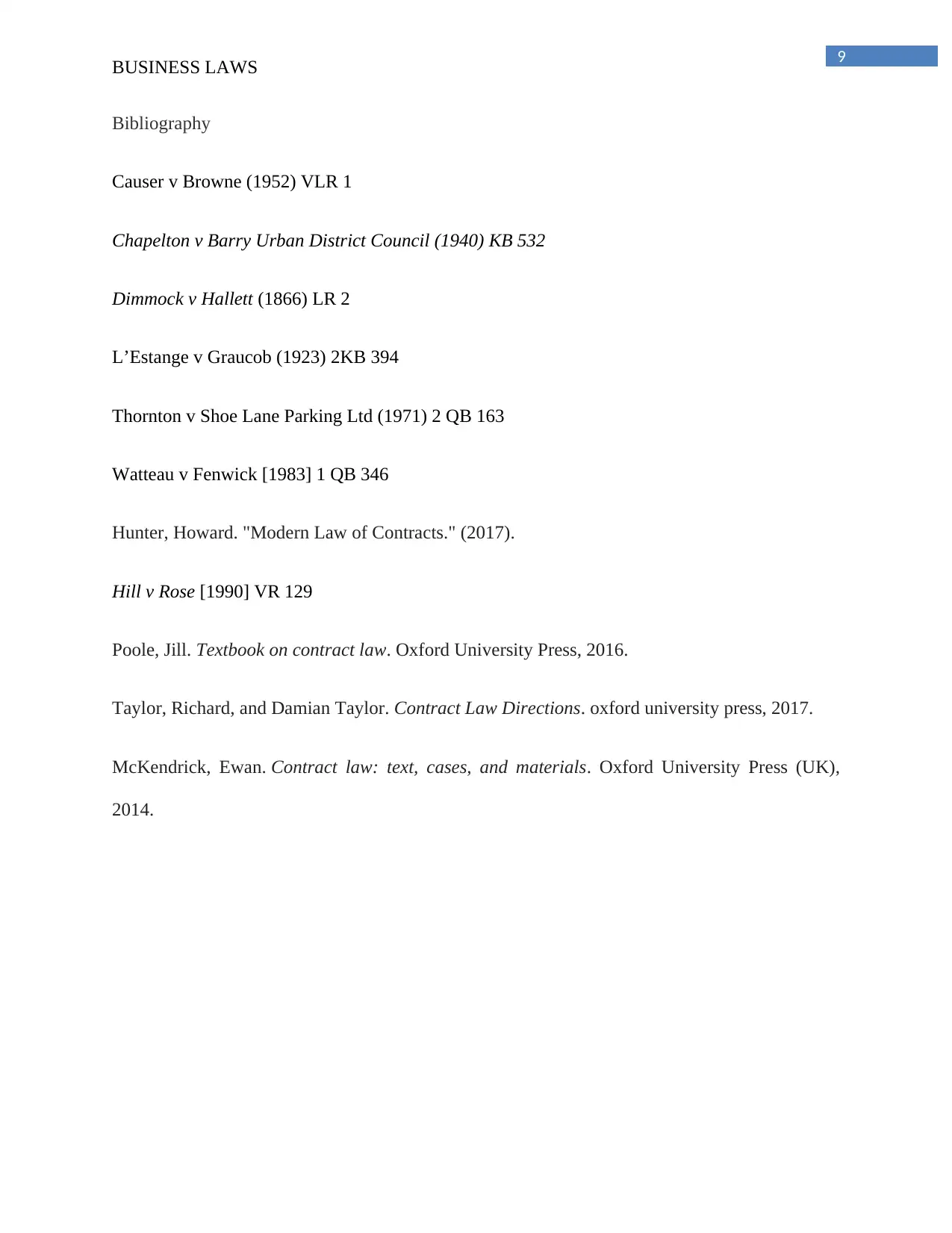
9
BUSINESS LAWS
Bibliography
Causer v Browne (1952) VLR 1
Chapelton v Barry Urban District Council (1940) KB 532
Dimmock v Hallett (1866) LR 2
L’Estange v Graucob (1923) 2KB 394
Thornton v Shoe Lane Parking Ltd (1971) 2 QB 163
Watteau v Fenwick [1983] 1 QB 346
Hunter, Howard. "Modern Law of Contracts." (2017).
Hill v Rose [1990] VR 129
Poole, Jill. Textbook on contract law. Oxford University Press, 2016.
Taylor, Richard, and Damian Taylor. Contract Law Directions. oxford university press, 2017.
McKendrick, Ewan. Contract law: text, cases, and materials. Oxford University Press (UK),
2014.
BUSINESS LAWS
Bibliography
Causer v Browne (1952) VLR 1
Chapelton v Barry Urban District Council (1940) KB 532
Dimmock v Hallett (1866) LR 2
L’Estange v Graucob (1923) 2KB 394
Thornton v Shoe Lane Parking Ltd (1971) 2 QB 163
Watteau v Fenwick [1983] 1 QB 346
Hunter, Howard. "Modern Law of Contracts." (2017).
Hill v Rose [1990] VR 129
Poole, Jill. Textbook on contract law. Oxford University Press, 2016.
Taylor, Richard, and Damian Taylor. Contract Law Directions. oxford university press, 2017.
McKendrick, Ewan. Contract law: text, cases, and materials. Oxford University Press (UK),
2014.
1 out of 10
Related Documents
Your All-in-One AI-Powered Toolkit for Academic Success.
+13062052269
info@desklib.com
Available 24*7 on WhatsApp / Email
![[object Object]](/_next/static/media/star-bottom.7253800d.svg)
Unlock your academic potential
Copyright © 2020–2026 A2Z Services. All Rights Reserved. Developed and managed by ZUCOL.





